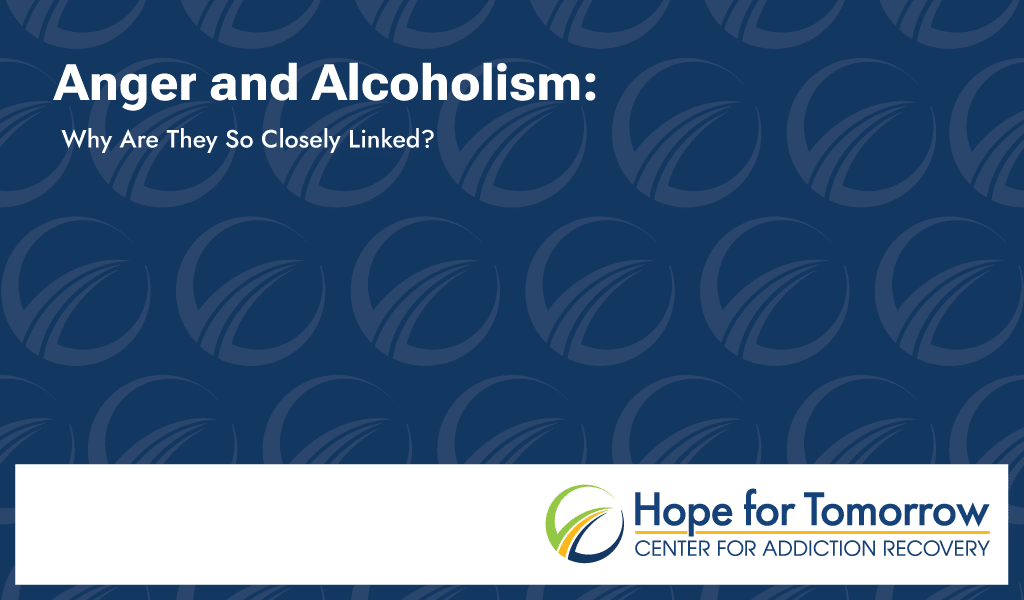

We’ve all seen a TV show or movie where there’s an “angry drunk.” Usually, it’s a man shouting or becoming violent. Sometimes a fight ensues, and someone is seriously hurt. Is there truth to that depiction?
In reality, between 16% and 50% of people with alcohol use disorders exhibit violent behavior. Different studies have found different results, but all of us at Hope for Tomorrow have seen the correlation between anger and alcoholism (alcohol use disorder) firsthand. Anyone who has been on the other side of alcohol-induced aggression can tell you it’s very real.
It’s not so simple as a media stereotype, though, especially when you add in the dynamic of an alcohol use disorder. These are complex emotions experienced by complex people with complex conditions. If you’ve been on the receiving end of alcohol-related violence, it can be hard to understand where it comes from, or why someone you care about so much can be so cruel. It’s confusing sometimes, too – especially if they aren’t an angry person when they aren’t under the influence of alcohol.
Understanding the relationship between anger and alcoholism is going to take an open mind and some empathy. If you’re ready, let’s break it down.
There’s nothing inherently wrong with anger. It’s a natural human emotion, and it can be a very useful one! Anger can give you the courage to speak up about injustices and fight for what you believe in.
Unfortunately, it can also lead to aggression and violence when left unchecked.
Anger and aggression don’t always go hand-in-hand, though. Anger is brought about by an unsatisfying or disappointing situation – usually one that makes you feel threatened physically or mentally. Aggression is a response that intends to harm someone in some way, whether it’s physically or verbally. You can be aggressive without being angry, and you can be angry without being aggressive.
Usually, when people think of an “angry drunk,” they mean an aggressive one. Sometimes anger is involved, too, but that anger tends to escalate very quickly into aggression.
To fully understand this dynamic and how it might impact your loved one, it’s important to know what an alcohol use disorder looks like. Here are some of the signs of alcohol use disorder used in the DSM-5 to diagnose the condition:
If your loved one meets two or more of these criteria, they can be diagnosed with an alcohol use disorder – but keep in mind that it can only be diagnosed by a mental health professional.

Now that you understand anger, aggression, and alcohol use disorder individually, putting it all together will make a little more sense.
Alcohol is a central nervous system depressant. That means it slows down the way your brain works – especially in your frontal lobe. This part of your brain is responsible for decision-making, emotional regulation, and impulse control. With these processes slowed down, it’s harder to control your emotions and behavior. That’s especially true if you already have trouble managing your anger, or you’re already feeling tense and irritated before you start drinking.
There’s also something called “alcohol myopia.” This is the idea that alcohol only allows you to notice the most obvious cues, and overlook more subtle ones. For example, if you’re drinking and someone runs into you on accident, you’ll notice the act of being run into more than anything else. You’d fixate on the negative and miss cues, like the person quietly apologizing, or their expression showing that they felt bad for running into you. This phenomenon can also lead to anger and aggression.
If you’re under the influence of alcohol a lot, as people with alcohol use disorders are, you’re in this state very often. On top of that, people with alcohol use disorders often drink to cope with some kind of pain – and that pain can also be a source of anger and aggression. Chronic drinking also damages parts of your brain related to emotional regulation and impulse control, making matters worse.
Another part of the equation to consider is that alcohol use disorder and alcohol-related aggression have a lot of the same risk factors. If you combine these pre-existing factors with the effects of alcohol, you have a recipe for alcohol-related aggression. Here are some qualities that are associated with both alcohol use disorders and becoming angry while intoxicated:
Here are some additional factors we know make alcohol-related aggression more likely:
40% of domestic violence incidences reported in the United States had alcohol as a factor. A wealth of evidence shows that domestic violence is more likely and more severe if a partner drinks heavily, especially if they are a man. Women who drink a lot of alcohol are actually more likely to be victims of domestic violence and aggression from their partners than women who don’t drink.
It is important to keep in mind that alcohol doesn’t necessarily cause domestic violence. Plenty of people with alcohol use disorders aren’t violent at all. It’s significantly more likely that alcohol just exacerbates any relational conflicts and negative emotions, and makes it harder to control those emotions and any behavior that results from them. Partners of individuals with alcohol use disorders may also feel frustrated over their drinking and confront them on it, which can lead to additional arguments, and subsequently, potential violence.
Reading all of this might feel very grim. Know that if your loved one has an inclination for aggression when drinking, they aren’t “doomed” to stay that way forever, and there is hope.
If your loved one addresses their troubling relationship with alcohol, that stimulus contributing to their anger will be removed from the equation. More than that, the therapy they’ll undergo to help them heal from their alcohol use disorder will likely help them manage their anger, too. They’ll learn skills to help them combat alcohol cravings, and develop coping mechanisms to fall back on instead of returning to drinking. Those can also be used to cope with anger and express it in healthy ways instead of harmful ones.

Alcoholism rehab is available. That’s the good news. Your loved one can heal from their alcohol use disorder and no longer be ruled by their anger. There is hope of escaping all of the arguments and cruelty without feeling like you’re leaving your loved one behind. Recovery is within reach!
The more difficult news is that getting your loved one into treatment probably won’t be easy. You’ll need to be patient. Look into treatment options, express your concern for them, and share resources when they aren’t angry and under the influence of alcohol. It might be your instinct to fight fire with fire, but staying calm is imperative to convince your loved one to seek the help they need.
When they’re ready, they have lots of options. From residential treatment to outpatient therapy, they’re bound to find something that suits them and considers every facet of who they are during treatment. That means addressing the alcohol use disorder and the anger together, like the closely linked complications they are, and not just one or the other. With the right care and some hard work, you and your loved one can find freedom from both.
Hope for Tomorrow is an addiction treatment center with locations in Point Pleasant and Beckley, WV. We offer a full continuum of care – from alcohol detox to ongoing therapy following the completion of any treatment programs. Our dual-diagnosis treatment also addresses any mental and emotional concerns on top of substance use disorders. No matter where you are in life, our team is here for you. Everyone deserves recovery. Call us at 877-679-8162 to get started today.
Treatment today for a brighter tomorrow.